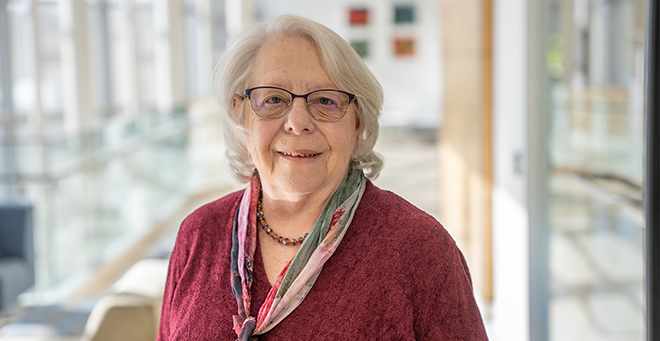
Susan L. Swain, PhD, professor of pathology, has received a $460,000 two-year exploratory grant from the National Institute of Allergy and Infectious Diseases to advance the ability to harness the unique B cells in older mice for an improved influenza vaccine for older adults.
The goal is to ultimately provide a blueprint for a vaccine that would recognize evolving influenza strains and provide long-lasting immunity to people throughout the life cycle, particularly among older adults, whose immune responses become weaker as they age.
Approximately 90 percent of flu-related deaths and 50 to 70 percent of flu-related hospitalizations occur in people 65 or older, according to the U.S. Centers for Disease Control and Prevention.
“I’ve tried to figure out how to make the best possible T and B cell memory (part of the adaptive immune response) for most of my career,” said Dr. Swain. “It’s really very striking that there are a lot of changes that occur with aging. They make it harder for an immune response to anything new to get started. It’s actually a restructuring of the system to avoid unnecessary responses.”
T cells release chemical signals called cytokines in response to an infectious agent. These cells help prime the maturation of B cells, which produce antibodies. Once the infectious agent has been fought off, memory T and B cells lie dormant until activated to protect against reinfection.
Swain found that in older mice, a recently discovered type of B cell called age-associated B cells are the only B cells that can respond and that they respond differently than B cells in younger mice. “They require a lot more of the pathogen-mediated signals that enhance immune responses,” she said. “That’s probably a good thing. But it means that our vaccines need to supply these signals.”
A universal vaccine would work on all people and elicit the kind of immune response that lasts longer and is more durable, according to Swain.
The current protein-based vaccine only provides about 32 percent protection. “The vaccines we do have don’t look like pathogens at all,” she said. “If you just have antigens and you don’t have all the other characteristics of a pathogen, you get a smaller response and only short-lived protection.”
Swain said her group will take investigation of this pathway to the next step, to show whether age-associated B cells, which are the only cells that respond in animals equivalent to age 70 or more in human years, can be harnessed to become memory cells that will give long-term protection against infection.
Related UMass Chan news story:
UMass Chan participating in clinical trials of Pfizer’s modified RNA influenza vaccine